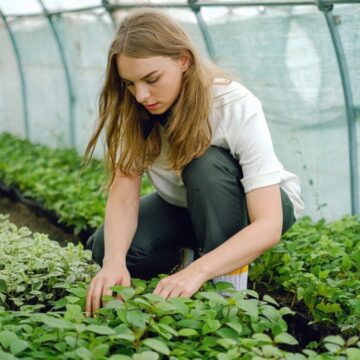
- Gardening is an aerobic activity that has been proven to reduce the risk of heart disease.
- Gardening tasks can help prevent weight gain and even promote weight loss.
- Learning about new plants and gardening techniques also helps stimulate the brain.
No matter your age, gardening can reward you with many unexpected health benefits. Gwenn Fried, manager of horticultural therapy at NYU Langone Medical Center’s Rusk Rehabilitation in New York City, says the most obvious benefit of gardening is being outdoors and getting fresh air. But there are several other benefits of gardening for the mind, body, and soul:
1. Makes your family love veggies

Growing your own vegetables might just make you eat more vegetables. According to a 2017 review of studies that appeared in the Journal of the Academy of Nutrition and Dietetics, kids who were introduced to gardening consumed more fruit and veggies.
2. Helps you manage weight

Gardening can help you avoid weight gain and even shed a few pounds. According to a 2013 study published in the American Journal of Public Health, a lower body mass index and a lower risk of being overweight were found in gardeners compared to non-gardeners. Gardening helped women lose about 11 pounds while men lost about 16 pounds.
3. Provides a great and fun workout

Gardening tasks, such as planting seeds, picking weeds, hoeing rows, shoveling manure, moving pots, pushing a mower, and carrying bags of mulch provide a whole-body workout, per a 2014 review of studies that appeared in the American Society for Horticultural Science journal. Since the aerobic activity is goal-oriented, Fried says it entices you to stay for a longer time and reap more benefits.
4. Relieves stress

Gardening is a stress reliever and provides positive sensory stimulation, according to a 2016 NASA experiment. The research found that planting and nurturing seeds lifted the mood and eased the stress of astronauts.
5. Reduces your risk of heart disease

According to a study published in the British Journal of Sports Medicine in 2013, gardening can lower the risk of a heart attack or stroke and lengthen life by 30 percent. The benefits may be attributed to the combination of physical activity and reduction of stress that gardening provides. According to Fried, reconnecting with the natural world boosts the activity’s stress-busting capacity, and tending a plant on a desk or a whole vegetable garden allows us to immerse ourselves in a green, growing, and healthy environment.
6. Helps slow climate change

Having your backyard garden can help you reverse or stop global climate change. Gardens help reduce greenhouse gasses, lessen your carbon footprint, and allow you to recycle kitchen waste, among other benefits, according to a National Wildlife Federation report.
7. Boosts your immune system

Soil has beneficial bacteria that may improve your immune system, help you get sick less, and fight off infections, according to a 2015 study that appeared in Immunotargets and Therapy.
8. Improves your hand coordination and strength

Gardening is the perfect way to improve your hand strength, flexibility, and coordination. Weeding for a few minutes daily may also ease some of the strain caused by too much typing or phone swiping.
9. Gives you hope for the future

According to Fried, gardening makes you hope for growth and change. She says, “When someone plants a seed and waters it, they have faith that the seed will send roots into the soil to support stems and leaves above.” When the seed starts to grow, it provides the same kind of faith and hope necessary for everyday life.
10. Sharpens your brain

Gardening is also a healthy workout for the brain, suggests a 2019 study that appeared in the International Journal of Environmental Research and Public Health. The study measured memory-related brain nerve growth factors in senior study participants, before and after they created a vegetable garden. The results showed a significant increase in the participants’ brain nerve growth.
Fried says “the most surprising benefit of gardening is the capacity for gardeners to become life-long learners”. Gardening allows us to learn about new plants and gardening techniques, or history and folklore, which stimulates our brains.
Via The Healthy
